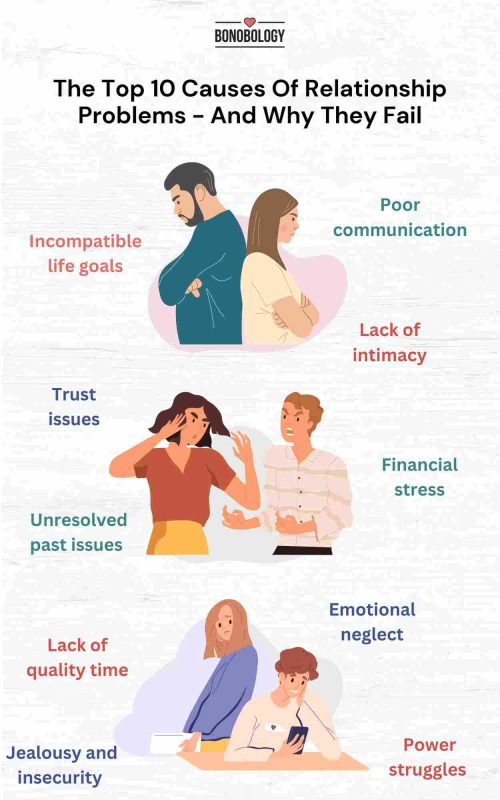Welcome to the captivating world of relationships — a dance of hearts and emotions where partners twirl and sway through the highs and lows of life together. To help you glide through this enchanting journey, we’ll unravel the top 10 causes of relationship problems, exploring the moments when the music falters and the magic loses its shine.
Communication missteps and the delicate balance of trust and intimacy can sway our hearts and give rise to relationship issues. In this article, Anushtha Mishra (M.Sc. in Counseling Psychology), who specializes in trauma, relationship issues, depression, anxiety, grief, and loneliness, explores the reasons for relationship problems and throws light on why some bonds flourish while others falter. Let’s delve into the intricacies of love to gain a deeper understanding of our relationship with our partner.
The Top 10 Causes Of Relationship Problems
Table of Contents
Let’s explore some of the most common relationship problems and see how those aspects can affect even the strongest bonds. From communication issues to trust concerns and beyond, let’s look at the reasons why relationships fail and affect a couple’s long-term success.
1. Poor communication
In a romantic relationship, good communication serves as the foundation upon which trust, intimacy, and understanding are built. A relationship grows when partners communicate effectively. When communication falters, it opens the door to a myriad of relationship issues that can deeply impact the bond between partners. Some of the most common consequences of poor communication are misunderstandings and unrealistic expectations. When partners are not on the same page and struggle to express themselves clearly or fail to listen attentively, messages can get lost in translation, leading to confusion and frustration.
One of my friends, John, and his wife, Sarah, got along like a house on fire. But John and Sarah’s once-open communication faded as they both grew distant. Sarah was often caught up due to long work hours, and John would spend more time with his friends. When John planned a surprise dinner, Sarah’s undisclosed plans caused him to feel unappreciated, leading to an accusatory confrontation. Misunderstandings escalated, breeding resentment and eroding trust. This ultimately strained their emotional connection, preventing them from addressing underlying issues
Communication styles can differ. However, a lack of it can hamper a healthy relationship by creating a disconnect between partners. They may feel that their needs and emotions are not being acknowledged or valued. Communication issues are one of the most common reasons why relationships fail. To establish good communication, you can try to:
- Set aside dedicated ‘talk time’ for open discussions
- Embrace active listening by giving each other full attention without interruptions
- Avoid jumping to conclusions and seek clarifications when needed
- Incorporate humor in tough conversations to ease tension and foster a comfortable sharing environment
The longer a couple goes without trying to improve communication between them, the worse it is for a relationship.
2. Trust issues
Trust issues create a constant sense of doubt and suspicion. A 2020 study highlighted that a lack of trust significantly predicts issues within romantic relationships. The research emphasized the influence of trust deficits on the emergence of problems within these partnerships. When one or both partners struggle to trust each other, it can lead to insecurity, jealousy, and a lack of emotional intimacy. One partner may find it challenging to open up and be vulnerable, leaving the other feeling betrayed or abandoned.
Besides, trust issues in a long-term relationship can give rise to communication problems and negative emotions, as doubts and suspicions can cloud honest and open conversations. This is why they should be addressed immediately.
A couple who came to me for therapy had a strong bond until one of the partner’s past dishonesty about their spending came to light. When the other partner discovered hidden expenses, it led to feelings of betrayal. The subsequent arguments eroded their trust. The lack of transparency made them question other aspects of their relationship, making it difficult to rebuild the intimacy they once shared.
To deal with such trust issues and build a healthy relationship, you can:
- Openly discuss past experiences or traumas that may have contributed to trust issues
- Practice consistent and transparent communication to reassure each other and build reliability
- Engage in activities that foster trust, like mutual goal-setting and sharing responsibilities
- Address trust issues with empathy and patience for a secure and committed relationship
Related Reading: Trust Issues – 10 Signs You Find It Difficult To Trust Anyone
3. Lack of intimacy
A poor sex life or lack of sexual intimacy can lead to significant problems in a romantic relationship. It can create feelings of emotional distance and disconnection. When partners do not share affection, emotional support, or quality time together, it can lead to feelings of neglect and insecurity. The lack of physical intimacy in long-term relationships can also affect the partners’ sense of closeness and intimacy. Soon, the couple may begin to feel less desired or valued.
A coworker of mine, Megan, and her husband, Chris, had an affectionate relationship that grew strained after they both became engrossed in their careers. Their diminishing physical and emotional connection led to a lack of intimacy. The absence of closeness made them feel like roommates rather than partners, causing frustration and a growing emotional detachment.
To overcome such sexual problems, you can:
- Prioritize spending quality time together for bonding and emotional connection
- Communicate openly about feelings, desires, and relationship issues, creating a safe space for vulnerability
- Embrace physical affection and gestures of love, like hugs, kisses, and holding hands, to reinforce the emotional connection
4. Incompatible life goals
Incompatible life goals are one of the most common relationship problems, as partners may find themselves heading in different directions with conflicting aspirations and priorities. When individuals have vastly different visions for their future, it can lead to feelings of frustration, resentment, and a sense of being held back. Moreover, the lack of alignment in life goals and professional and social circles can hinder effective decision-making, as compromises become challenging to reach. Eventually, the couple begins to feel unfulfilled and unsatisfied.
A batchmate, Emily, envisioned a nomadic lifestyle, exploring the world, while her partner, Jack, aimed for stability and a settled family life. Their contrasting life goals became evident over time, causing tension and disagreements. The divergence in their aspirations made it challenging to envision a shared future, leading to doubts about long-term compatibility and ultimately straining their relationship
However, you can work on this by:
- Having open and honest discussions about your common interests, life goals, and aspirations
- Finding common ground where possible and evaluating the potential for compromise and mutual support
- Being willing to explore creative solutions for differences in life goals
- Seeking couples counseling for external guidance, if needed, to navigate challenges
- Learning to appreciate, respect, and celebrate your partner, if they’re advancing quickly
- Working together to find a way to move forward while respecting each other’s individual dreams and ambitions
A 2016 study underscores the significance of factoring in one’s partner’s life plans when making relationship decisions. This practice holds crucial implications for preventing marital dissolution, as indicated by the research.

5. Financial stress
Let’s start off with some stats on how financial stress affects a relationship. According to a survey done by the AICPA & CIMA in 2021:
- Close to 50% of American couples facing financial strain acknowledge its detrimental effect on their intimacy levels
- About 70% of married or cohabiting Americans have engaged in financial disagreements with their partners within the last year
- Financial ‘infidelity’ is a factor leading to the termination of 40% of relationships
- Parents with children at home encounter notably elevated instances of relationship challenges stemming from financial matters
Financial issues can strain a romantic relationship, leading to arguments, resentment, and a lack of trust. Money problems burden partners, affecting their emotional well-being and communication, and eroding intimacy and connection. Differing spending habits cause conflicts over spending and budgeting, hindering financial incompatibility and stability.
As Lisa and Mark, two of my friends, faced mounting financial pressures in their relationship, their communication about money dwindled. Disagreements on budgeting and spending choices escalated into frequent arguments, causing resentment. The strain of constant financial worry created a tense atmosphere, making it difficult for them to find common ground and undermining the emotional connection they once had.
To deal with relationship issues related to finances, you can:
- Openly discuss financial pressures and concerns to understand each other’s perspectives
- Set clear financial goals together and create a budget that aligns with both partners’ values and priorities
- Seek professional financial advice to overcome money challenges
- Be supportive and empathetic when you face money issues, remembering that you’re in this together
Related Reading: 5 Ways To Overcome Financial Stress In Relationships
6. Unresolved past issues
Unresolved past issues can resurface and impact the present dynamic of romantic relationships. Unaddressed emotional baggage from past experiences, such as previous relationships, childhood traumas, or unresolved conflicts, can lead to unrealistic expectations, insecurity, trust issues, physical abuse, substance abuse, and emotional distance. These unresolved problems may trigger mental health issues like defensive behaviors or emotional shutdowns, hindering open communication and vulnerability. A couple’s expectations also go for a toss if past issues persist.
Emma is a 23-year-old fashion designer who has been in a committed relationship with her fiance Liam for about 4 years now. Their relationship, however, suffered as they both brought unresolved past traumas into their dynamic. Their unaddressed emotional baggage led to triggers and misunderstandings. Attempts to discuss these issues often resulted in defensiveness and escalated tensions, preventing them from moving forward and deepening their emotional distance. They eventually called off the wedding to work on themselves.
To deal with this particular concern, try to:
- Create a safe space for open discussions about past experiences and feelings, without any judgment
- Practice active listening and offer each other support with understanding and empathy
- Consider seeking professional help, like couples therapy, to navigate through challenging issues and find healthy ways to heal and grow together

7. Jealousy and insecurity
Jealousy and insecurity are two of the most significant of the top 10 causes of relationship problems that breed feelings of mistrust and doubt. When one or both partners struggle with jealousy, it can lead to possessiveness, controlling behavior, and constant suspicion, which can ultimately affect the relationship’s trust and emotional connection. Insecurity and low self esteem can manifest in seeking constant reassurance, feeling unworthy of love, and being overly sensitive to perceived threats, creating a tense and unstable environment.
In such a case, try to:
- Communicate openly about feelings and concerns, reassuring each other of commitment and love
- Build confidence and trust in yourself and the relationship, fostering security and independence
- Address underlying insecurities and seek support, like individual therapy, to overcome jealousy and foster a healthier, more balanced romantic relationship
8. Lack of quality time
This is one of the top relationship problems couples encounter. Lack of quality time can make partners feel neglected, unimportant, or emotionally disconnected. When the demands of daily life take precedence over spending time together, it can erode the emotional bond and intimacy between partners, causing them to drift apart. An emotional connection is one of the deepest psychological needs in a relationship. The absence of meaningful interactions can also lead to misunderstandings and miscommunication, making it challenging to address relationship issues effectively.
Ryan is a high-achieving entrepreneur, and Sarah is the lead chef of a renowned restaurant. Due to their busy schedules, their relationship took a hit, leaving them with minimal quality time together. Their limited interactions led to emotional distance and a sense of neglect. Attempts to connect were often rushed or postponed, fueling frustration and resentment. The lack of meaningful moments strained their bond, making it hard to maintain a strong connection.
If you or anyone you know finds themselves going through this, it’s always a good idea to:
- Prioritize dedicated time for each other regularly to foster bonding and emotional connection
- Engage in activities that promote closeness and intimacy
- Put away distractions like phones and laptops during quality time, so that both can be fully present and attentive
- Express affection and appreciation openly to reaffirm the importance of the relationship and create a stronger emotional connection

9. Emotional neglect
Emotional neglect in romantic relationships leaves one or both partners feeling unheard, unimportant, and emotionally disconnected. When emotional needs are consistently unmet, it can lead to feelings of loneliness and resentment, along with a lack of intimacy, which can deeply impact their mental health. Partners may begin to withdraw or seek emotional fulfillment elsewhere, resulting in a breakdown of trust and emotional bonds. Moreover, unresolved emotional neglect can breed communication issues, as partners may struggle to express their feelings and needs, perpetuating a cycle of distance and dissatisfaction.
Emotional neglect can be overwhelming to deal with. Try the following to understand and deal with such a situation better:
- Openly communicate your emotional needs, feelings, and external pressures (if any), creating a safe space for vulnerability and empathy
- Practice active listening and show genuine interest in your partner’s emotions and experiences
- Be emotionally available and supportive, making a conscious effort to meet each other’s emotional needs and strengthen the emotional connection
Related Reading: Emotional Neglect In A Relationship – Meaning, Signs And Steps To Cope
10. Power struggles
They create a dynamic of competition and control, eroding trust and emotional intimacy. When partners constantly vie for dominance or seek to assert their authority, it can lead to resentment, communication breakdowns, and a sense of being unheard or undervalued. These are major relationship issues. This struggle for power can escalate conflicts, especially parental conflict, and hinder effective problem-solving. This can also make it challenging to find compromises and mutual understanding amid life obligations.
David and Emily met in their teens, and their once American dream love was now put to the test due to the constant battle for control in their relationship, leading to power struggles and resentment. Decisions, big or small, became battlegrounds rather than discussions. This constant friction eroded their sense of romance, creating an environment of competition rather than teamwork. The struggle for dominance hindered their ability to nurture a healthy emotional connection.
Power struggles can come naturally, especially during the child-rearing period. If this happens, it’s important to:
- Acknowledge the relationship as a partnership with equal value and contributions from both partners
- Practice open communication. Understand each other’s core values, perspectives, and needs, without dismissal or belittlement
- Embrace empathy and compromise, allowing for a balanced distribution of power and decision-making in the relationship
As per social psychologist Theresa E. DiDonato, an essential factor for a thriving long-term relationship involves consistently reevaluating the distribution of influence. In relationships characterized by well-being, the dynamics of power are bound to evolve over time, mirroring the growth and evolution of both individuals and their collective efforts in facing novel life obstacles.
Key Pointers
- Love is a wild roller coaster ride, and it’s okay to hit a few bumps along the way
- Communication issues, lack of intimacy, power struggles, and more mentioned above are a few of the top causes of relationship problems
- Being able to discuss feelings, concerns, and past experiences openly creates a safe space for vulnerability and understanding, making open communication the foundation of a strong relationship
So there you have it, the top 10 causes of relationship problems — the ultimate guide to why they fail and how to conquer such relationship misses like superheroes. Remember, love is a wild roller coaster ride, and it’s okay to hit a few bumps along the way. Embrace the adventure, communicate like pros, take care of each other’s overall well-being, wield empathy, and compromise like magic spells.
With this, you and your partner are ready to overcome challenges that come your way. So go ahead and let your love story soar to new heights of passion, understanding, and endless laughter! Together, you’ll create a tale of romance that’ll put fairytales to shame! If you’re looking for relationship advice or marriage counseling, don’t hesitate to reach out to Bonobology’s panel of licensed and experienced therapists for help. Together, you can make your relationship work.
The Complexities Of Modern Dating And How To Navigate Them: A Complete Guide
Your contribution does not constitute a charitable donation. It will allow Bonobology to continue bringing you new and up-to-date information in our pursuit of helping anyone in the world to learn how to do anything.
Ask Our Expert
You must be Logged in to ask a question.



Featured
Your Guide To Getting The Fourth Date Right
15 Delightful Signs The Talking Stage Is Going Well
How To Say Sorry To Your Boyfriend Through Text
My Girlfriend Rejected My Proposal: What Should I Do?
When And How To Ask For A Second Date
How To Get Over Infatuation: 17 Psychological Tricks
How To Talk Intimately With Your Boyfriend Over Text—15 Easy Ways
13 Red Flags When Dating An Older Man | Don’t Ignore These
100 Best Hinge Prompts With Answers For Instant Connections
What Does Taking A Break Mean To A Guy And How To Deal With It
Bumble Compliments: How To Use And What To Write
7 Early Signs Of A Highly Compatible Relationship
What Is A Soft Launch Relationship? All You Need To Know
35 Relationship Emojis — Creative Ways To Communicate With Boo
How To Make The Most Of A Date With A Chinese Woman When You Don’t Speak Her Language
Millennial Dating: Decoding The Generation’s Struggle With Love And Relationships
11 Sweet Things To Do In A Long-Distance Relationship
11 Ways Of Flirting With Older Women | Keep It Classy
11 Perks Of Dating A Tomboy And How To Make It Work
100 Physics Pickup Lines Only The Sharp-Minded Will Get